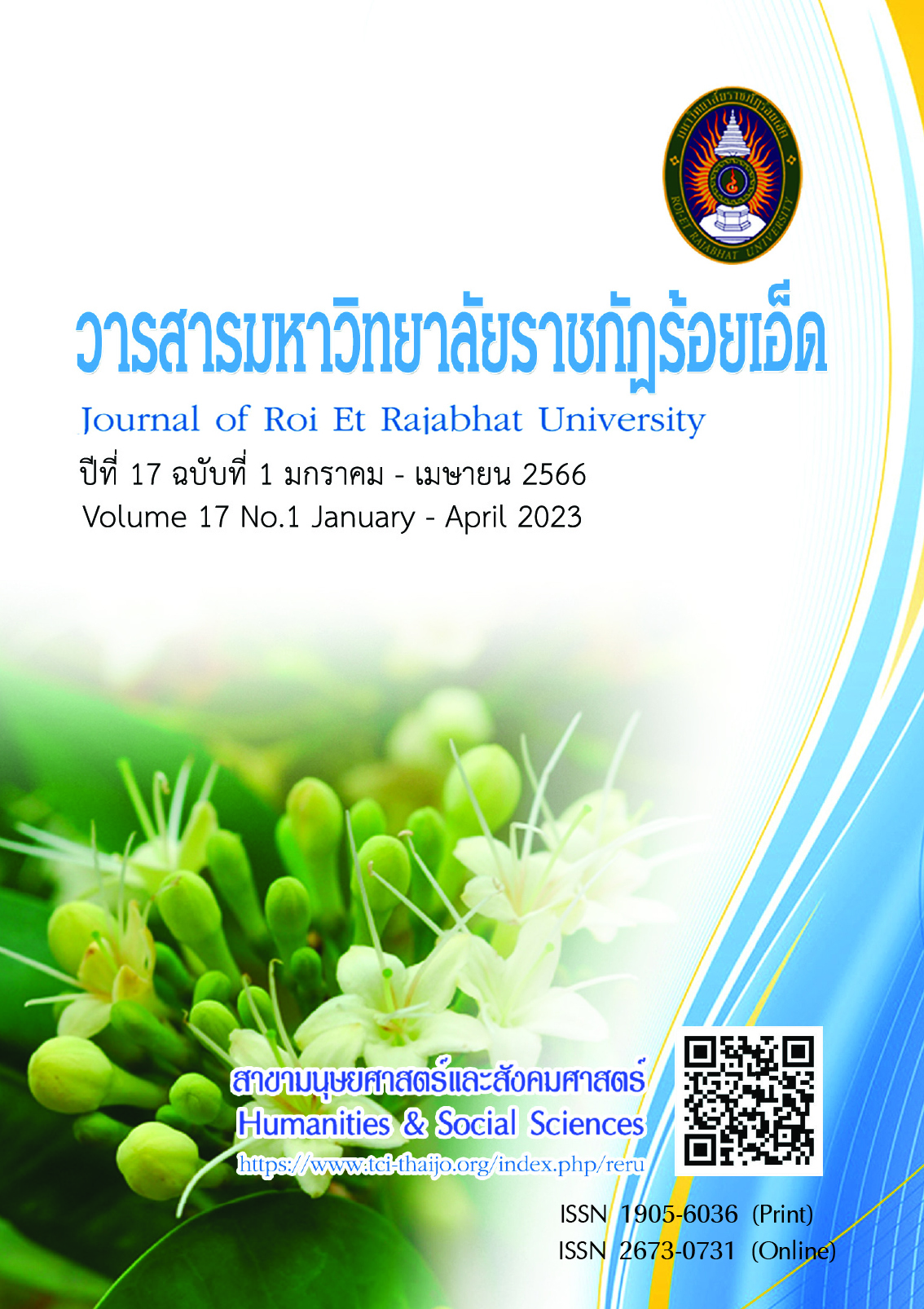Development of Analytical Thinking Ability by Using Learning Activities Based on Constructivist Concepts for Grade 8 Students
Keywords:
Analytical thinking ability, Constructivism, Learning activitiesAbstract
This research aimed to develop analytical thinking ability by using learning activities based on the concept of constructivism for Grade 8 students with an expected minimum average score of 70.00 % of the full score. The target group was 21 Grade 8 students of Bankanhaknonyai School (Sirigate Prachawit), Mueang Roi Et District, Roi Et Province. They were studying in the second semester of the academic year 2020. The research used 3 cycles of action research. The Research instrument were 7 lesson plans based a
on constructivist learning management plan. And the instruments used for data collection and analysis were
1) A multiple-choice analytical thinking ability test with 4 choices, and 84 items. and 2) A student learning reflection form. The quantitative data was analyzed through mean, percentage, and standard deviation whereas the qualitative data was analyzed through narrative content analysis.
The research results of developing analytical thinking ability by using learning activities based on the concept of constructivism indicated that Grade 8 students had higher analytical thinking ability. After an intervention, 14 students (66.67%) showed an average test score of 26.24 from a full score of 36 points or 72.88% of the full score, which passed the criterion score of 70.00%
References
กระทรวงศึกษาธิการ. (2561). หลักสูตรแกนกลางการศึกษาขั้นพื้นฐาน พุทธศักราช 2551 (ฉบับปรับปรุง พ.ศ. 2560). กรุงเทพฯ: โรงพิมพ์ชุมนุมสหกรณ์การเกษตรแห่งประเทศไทย จำกัด.
ทิศนา แขมมณี. (2562). ศาสตร์การสอน องค์ความรู้เพื่อการจัดกระบวนการเรียนรู้ที่มีประสิทธิภาพ (พิมพ์ครั้งที่ 23).กรุงเทพฯ: จุฬาลงกรณ์มหาวิทยาลัย.
นงลักษณ์ งามวาจา. (2560). การศึกษาผลสัมฤทธิ์ทางการเรียน เรื่องภูมิศาสตร์ ของนักเรียนชั้นประถมศึกษาปีที่ 5 โรงเรียนวัดปู่เจ้า จังหวัดสุพรรณบุรี โดยใช้เทคนิคการสอนแบบซิปปา (CIPPA Model). วิทยานิพนธ์ ศึกษาศาสตรมหาบัณฑิต สาขาวิชาหลักสูตรและการสอน. กรุงเทพฯ: มหาวิทยาลัยนอร์ทกรุงเทพ.
โรงเรียนบ้านคานหักโนนใหญ่ (ศิริเกตุประชาวิทย์). (2563). รายงานการประเมินตนเองของสถานศึกษา โรงเรียนบ้านคานหักโนนใหญ่ (ศิริเกตุประชาวิทย์) (Self-Assessment Report) ปีการศึกษา 2562. ร้อยเอ็ด: โรงเรียนบ้านคานหักโนนใหญ่ (ศิริเกตุประชาวิทย์).
วิภาวรรณ สุขสุวรรณ. (2559). การพัฒนากิจกรรมเรียนรู้ตามแนวคอนสตรัคติวิสต์ที่ส่งเสริมความสามารถในการคิดวิเคราะห์เรื่อง สมการเชิงเส้นตัวแปรเดียว สำหรับนักเรียนชั้นมัธยมศึกษาปีที่ 1. วิทยานิพนธ์ ครุศาสตรมหาบัณฑิต สาขาวิชาหลักสูตรและการเรียนการสอน. พิษณุโลก: มหาวิทยาลัยนเรศวร.
สุนิสา บางพิเศษ และประสาท เนืองเฉลิม (2562:). ศึกษางานวิจัยเรื่องการพัฒนาการคิดวิเคราะห์ของนักเรียนชั้นประถมศึกษาปีที่ 5 ที่ได้รับการจัดการเรียนรู้ตามแนวทางสะเต็มศึกษา. วารสารมหาวิทยาลัยราชภัฏร้อยเอ็ด, 13(3), 184-195.
อโนมา ทุพแหม่ง. (2560). การพัฒนาคู่มือการจัดการเรียนรู้ตามแนวทฤษฎีคอนสตรัคติวิสต์ร่วมกับการใช้สมองเป็นฐานเพื่อเสริมสร้างการคิดวิเคราะห์ความสามารถในการให้เหตุผลและผลสัมฤทธิ์ทางการเรียน วิชาคณิตศาสตร์ของนักเรียนชั้นประถมศึกษาปีที่ 6. วิทยานิพนธ์ ครุศาสตรมหาบัณฑิต สาขาวิชาการวิจัยและพัฒนาการศึกษา. สกลนคร: มหาวิทยาลัยราชภัฏสกลนคร.
Jong, S. K. (2005). The Effects of a Constructivist Teaching Approach on Student Academic Achievement, Self-concept, and Learning Strategies. Asia Pacific Education Review, 6(1), 7-19.
Downloads
Published
How to Cite
Issue
Section
License
Copyright (c) 2023 Roi Et Rajabhat University

This work is licensed under a Creative Commons Attribution-NonCommercial-NoDerivatives 4.0 International License.
บทความที่ได้รับการตีพิมพ์เป็นลิขสิทธิ์ของวารสารมหาวิทยาลัยราชภัฎร้อยเอ็ด
ข้อความที่ปรากฏในบทความแต่ละเรื่องในวารสารวิชาการเล่มนี้เป็นความคิดเห็นส่วนตัวของผู้เขียนแต่ละท่านไม่เกี่ยวข้องกับมหาวิทยาลัยราชภัฎร้อยเอ็ด และคณาจารย์ท่านอื่นๆในมหาวิทยาลัยฯ แต่อย่างใด ความรับผิดชอบองค์ประกอบทั้งหมดของบทความแต่ละเรื่องเป็นของผู้เขียนแต่ละท่าน หากมีความผิดพลาดใดๆ ผู้เขียนแต่ละท่านจะรับผิดชอบบทความของตนเองแต่ผู้เดียว





